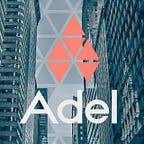Blockchain Will Transform Retail Lending
By: Gabriel Dusil , co-Founder & General Manager, Adel Ecosystem Ltd.
John McLeod, Founder, JEA Associates Ltd.
One of the great surprises of the Blockchain revolution is that banks continue to occupy a near monopolistic position within financial services, despite their obvious and much-publicized inadequacies. In the UK alone, five high street banks account for 80 percent of SME businesses, and control over 80 percent of domestic bank accounts. Even with the advances made with the digitalization across communications, media and computing industries, their hold remains as tight as ever.
Traditionally this stranglehold has been attributed to high barriers-to-entry, not least regulation and capital ratios for potential lenders. However, in an era where anyone with a car can become a taxi driver and anyone with a spare room can become a guest house, it’s realistic for people with spare cash to become a lender. Since the Renaissance, banking has been carried out on an institution-to-consumer basis or an institution-to-institution basis. Legal and accounting frameworks governing banks have, by and large, remained the same for half a millennia. In fairness, there have been some useful inventions pushing the financial agenda forward – such as online banking, ATMs and credit/debit cards – however, the benefactors of these financial systems reside overwhelmingly in the developed world. With over two billion unbanked in the world, the need for a more equitable and inclusive approach has never been greater.
The use of blockchain technology, particularly smart contracts, has the potential to disrupt the entire retail banking sector, creating a decentralized peer-to-peer network that enables people to borrow and lend in a more streamlined manner. Programmatically settling pre-agreed terms and conditions between two parties was not possible just a few years ago. This is still contingent on account holders willing to take on the same risks as banks, evaluate an creditworthiness, pre-arrange written contracts with customized terms and conditions, and at what rate. When these parameters are met then money can be automatically paid, without the need for a human intermediary. This is the basis of smart contracts.
The benefits of blockchain for retail lending encouraged greater competition. Financial monopolies are finally challenged by virtual currencies, and billions of people in developing markets can have access to loans that were previously too expensive or inaccessible.
The current centralized financial industry has enormous disparities in global lending interest rates. Today, the inflation-adjusted interest rate in different countries varies based on available liquidity. In high liquidity markets such as Europe, interest rates are between 0.5 to 5 percent. In lower liquidity markets such as Russia, they are at 12 to 15 percent, 12 percent in India, and as high as 32 percent in Brazil. These dramatic differences demonstrate a clear inequality. Interest rates for microloans in developing countries are between 30 to 40 percent on average, making borrowing impractical. Interest rates for decentralized lending on the blockchain is a streamlined solution to this disparity. Consumers from developing countries can have access to the same lending services as people from highly liquid markets.
These benefits go beyond just fairness and inclusivity. Blockchain radically improves on the problems associated with legacy systems, transaction latency and transparency. It still takes three working days to approve loans, or transfer money between cross-border accounts. In blockchain this transaction is carried out in minutes, using just an internet connected smartphone.
For the first time in history blockchain service providers (BSP) have the potential to create a fairer and more inclusive lending environment. Dated infrastructures, fragmented governance and economic borders are often cited as why financial lending fails on a global scale. A recent report by McKinsey cited that Blockchain technology and inclusion in the digital economy could boost GDP of all emerging economies by six percent. That translates to $3.7 trillion by 2025. The role of retail banks, in both developed and developing markets, in promoting sustainable and fair services has been questioned. Accessibility, fair terms, and transparency have denied large chunks of the world’s population to banking services that developed countries have enjoyed for decades. Smart contract technology provides the solution to disrupting this elitist source of finance. The potential gains and benefits to global economics and society are on the horizon. The question remains: Will people take advantage of it?
About the Authors
Gabriel Dusil, co-Founder & General Manager, Adel
Gabriel is a seasoned sales and marketing expert with over 25 years in senior positions at Motorola, VeriSign (acquired by Symantec in 2010 for 1.250 billion US$), and SecureWorks (acquired by Dell in 2011 for 612 million US$), and Cognitive Security (acquired by Cisco in 2013 for 25 million US$). He is a blockchain entrepreneur, with strengths in international business strategy. Gabriel has a bachelor’s degree in Engineering Physics from McMaster University in Canada and expert knowledge in blockchain incubation, cloud computing, IT security, and video streaming, and Over the Top Content (OTT). Gabriel also runs his own company, Euro Tech Startups s.r.o., and manages a professional blog at https://dusil.com.
LinkedIn ▲ linkedin.com/in/gabrieldusil/
Twitter ▲ https://twitter.com/dusilg
SlideShare ▲ https://www.slideshare.net/gdusil
Company ▲ http://eurostartups.tech/
Behance ▲ https://www.behance.net/dusil
YouTube ▲ https://www.youtube.com/user/gdusil
John McLeod, Public Relations, Adel
John has spent nearly a decade working for a number of leading public relations firms in London, focusing primarily on PR management in the financial services sector. John’s expertise includes blockchain technology and the evolution of cryptocurrencies in financial services. That’s why he recently founded his own consulting firm, JEA Associates Ltd., which is specifically positioned to communicate the value proposition of this burgeoning technology. John has spent the past year successfully executing campaigns for a digital currency consultancy, decentralized financial solutions, and online payments platforms.
